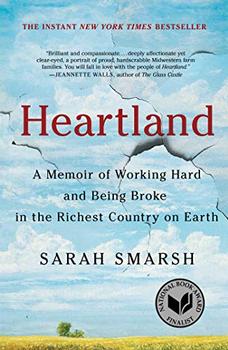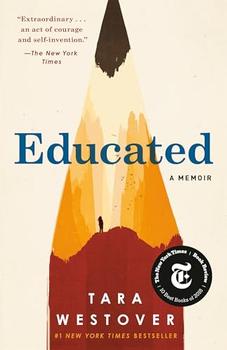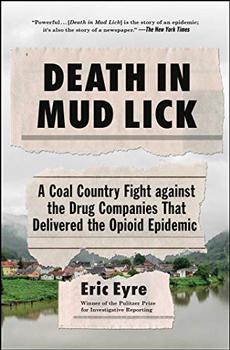Summary | Excerpt | Reading Guide | Reviews | Beyond the book | Read-Alikes | Genres & Themes | Author Bio

A Memoir of Working Hard and Being Broke in the Richest Country on Earth
by Sarah SmarshA perfect companion to Evicted and Nickel and Dimed, Heartland reveals one woman's experience of working class poverty with a startlingly observed, eye-opening, and topical personal story.
During Sarah Smarsh's turbulent childhood in Kansas in the 1980s and 1990s, the forces of cyclical poverty and the country's changing economic policies solidified her family's place among the working poor. By telling the story of her life and the lives of the people she loves, Smarsh challenges us to look more closely at the class divide in our country and examine the myths about people thought to be less because they earn less. Her personal history affirms the corrosive impact intergenerational poverty can have on individuals, families, and communities, and she explores this idea as lived experience, metaphor, and level of consciousness.
Smarsh was born a fifth generation Kansas wheat farmer on her paternal side and the product of generations of teen mothers on her maternal side. Through her experiences growing up as the daughter of a dissatisfied young mother and raised predominantly by her grandmother on a farm thirty miles west of Wichita, we are given a unique and essential look into the lives of poor and working class Americans living in the heartland. Combining memoir with powerful analysis and cultural commentary, Heartland is an uncompromising look at class, identity, and the particular perils of having less in a country known for its excess.
Though Smarsh tells her story with grace and compassion, one structural detail stands out as a distracting oddity. Much of the book is addressed to "you." Blink and you'll miss the reason why. Smarsh is writing as if to her daughter, a person who does not and may never exist, because Smarsh has chosen to remain childless. Despite this idiosyncrasy feeling odd to the reader, it is not a narrative choice Smarsh made illogically. In addressing her non-existent daughter, Smarsh calls attention to one aspect of impoverished women's lives that often seals their fate: having children early and grappling with supporting them during the years middle- and upper-class women typically get ahead with education...continued
Full Review
(662 words)
This review is available to non-members for a limited time. For full access,
become a member today.
(Reviewed by Rebecca Renner).
 Contrary to many deeply guarded beliefs about people living in poverty in the United States, most who can't afford the necessities of life are, in fact, employed. The United Way calls these people Asset Limited, Income Constrained, Employed (ALICE). More than 34.7 million families in the United States (10.6%) fell into this category in 2018, and their numbers are growing. You probably see them every day. They're waitresses, receptionists, salespeople and cashiers. They get by month-to-month and are able to save very little. This is because poverty is expensive.
Contrary to many deeply guarded beliefs about people living in poverty in the United States, most who can't afford the necessities of life are, in fact, employed. The United Way calls these people Asset Limited, Income Constrained, Employed (ALICE). More than 34.7 million families in the United States (10.6%) fell into this category in 2018, and their numbers are growing. You probably see them every day. They're waitresses, receptionists, salespeople and cashiers. They get by month-to-month and are able to save very little. This is because poverty is expensive.
Housing
One of the largest expenses for any budget is housing. Across the U.S., the growing cost of rent has greatly outpaced wages. Approximately 47% of renters spend more than ...
This "beyond the book" feature is available to non-members for a limited time. Join today for full access.

If you liked Heartland, try these:

by Tara Westover
Published 2022
Winner of the 2018 BookBrowse Nonfiction Award
An unforgettable memoir about a young girl who, kept out of school, leaves her survivalist family and goes on to earn a PhD from Cambridge University.

by Eric Eyre
Published 2021
From a Pulitzer Prize–winning reporter from the smallest newspaper ever to win the prize in the investigative reporting category, an urgent, riveting, and heartbreaking investigation into the corporate greed that pumped millions of pain pills into small Appalachian towns, decimating communities.
Children are not the people of tomorrow, but people today.
Click Here to find out who said this, as well as discovering other famous literary quotes!